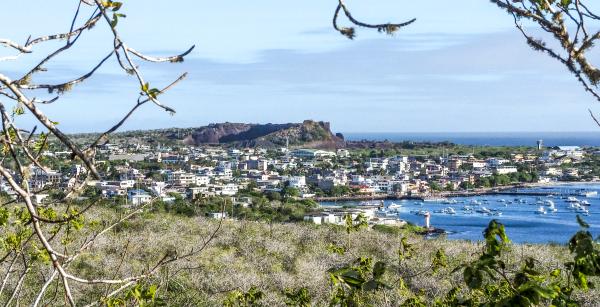Do-No-Harm, Do-More-Good: Building for Sustainability in the Galapagos

Ecuador’s Galapagos Islands are renowned for their singular ecology and iconic natural beauty. Recently, however, a surge in land-based tourism has placed pressure on the islands’ complex and already fragile ecosystem. As part of The University of Texas at Austin’s annual President’s Award for Global Learning, Professor David Heymann, working in collaboration with Gregory Brooks, Professor of Practice in the Cockrell School of Engineering, and Dr. Jayme Walenta, Lecturer in the Department of Geography and the Environment in the College of Liberal Arts, has co-developed a proposal to study the global challenge of sustainable growth as it manifests in the Galapagos, engaging both students as well as international collaborators.
Relaunched by President Jay Hartzell under a renewed vision, The President’s Award for Global Learning empowers students and faculty to examine real-world interdisciplinary topics while incorporating in-country learning into the classroom experience. This year, Texas Global selected only three faculty programs for the campus-wide award, including Heymann’s “Do-No-Harm, Do-More-Good: Building for Sustainability in the Galapagos.” Working in collaboration with stakeholders that include the University of San Francisco-Quito [USFQ], the global engineering firm Buro Happold, Galapagos islanders and officials, economists, and theoreticians, students in this program will consider complex questions of how sustainable relations develop between natural environments, human uses and needs, and the built environment.
The impetus for the “Do-No-Harm” project grew out of Professor Heymann’s previous work in Ecuador, both with UTSOA students and as a guest professor in USFQ’s summer programs in 2018 and 2019. Designated to supervise all academic research in the Galapagos, USFQ faculty and staff are embedded members of the Galapagos community. Coordinated through USFQ Architecture Professor Maria Isabel Paz, with whom Heymann has previously taught, USFQ faculty will collaborate with student participants to ensure their solutions serve the local population. Additionally, students will collaborate with the international engineering firm Buro Happold. The firm has developed a proprietary environmental assessment software it will redesign for student use, and they will be undertaking parallel research in the area to expand upon the students’ work.
“The Galapagos is one of the most challenging places in the world to consider the potential impact of architecture in light of the desire for sustainability,” Heymann said. “Sustainable design requires different forms of expertise, and with our team’s varied backgrounds in architecture, engineering, policy, and the various ways that humans and nature interact with one another, we are looking forward to developing projects with students that will add value to this unfolding and complicated real-world challenge.”
Following Texas Global’s announcement of the selected faculty proposals in early September, interdisciplinary student teams are invited to propose projects that fit within the program themes. Interested students should attend one of Texas Global’s four information sessions taking place this September and October, as well as the upcoming virtual Team Match Event on Friday, October 1. The application deadline is November 1. Selected student teams will then enroll in a 3-hour course during the Spring 2022 semester and a 1-hour course during the Fall 2022 semester. Coursework includes funded travel to the Galapagos, twice: for ten days over Spring Break, and for two weeks during the 2022 summer.
